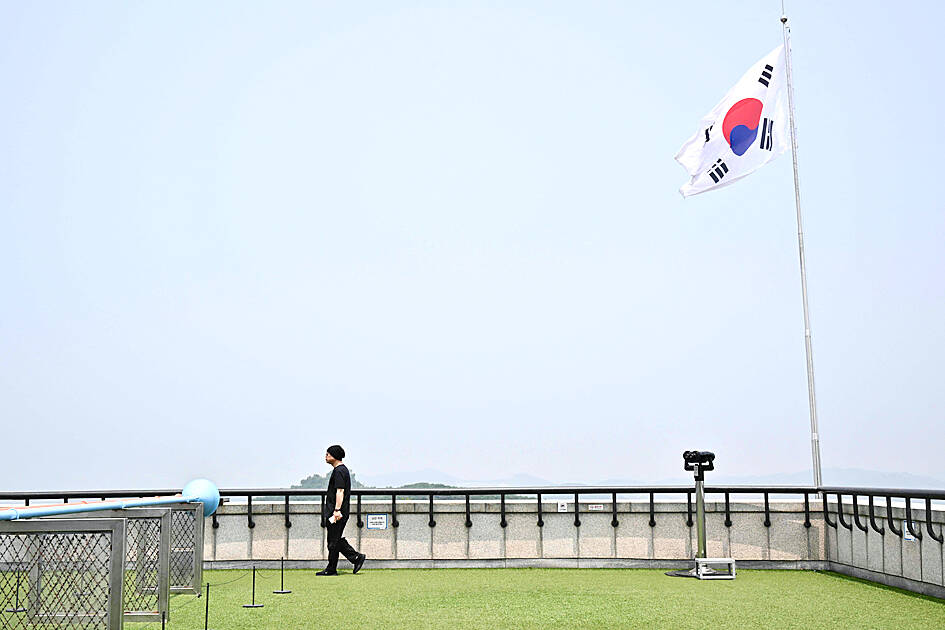South Korean troops fired warning shots after North Korean soldiers briefly crossed the border this week, Seoul’s military said yesterday, with tensions high over Pyongyang’s barrage of trash-carrying balloons and the South’s retaliatory loudspeaker campaign.
The Sunday incursion over the line that separates the two militaries took place in an overgrown area of the heavily fortified border area and was likely accidental, the South Korean Joint Chiefs of Staff (JCS) said.
“Some North Korean soldiers working within the DMZ [demilitarized zone] on the central front briefly crossed the Military Demarcation Line [MDL],” the JCS said in a statement, referring to the line of control between the two Koreas.

Photo: AFP
“After our military issued warning broadcasts and warning shots, they retreated northward,” it said, adding that there had been “no unusual movements observed” subsequently.
About 20 North Korean soldiers crossed the border, the JCS said.
The incursion was likely accidental, JCS spokesperson Lee Sung-joon told reporters yesterday.
“The situation at that time was that the DMZ was now overgrown with trees and the MDL mark was not clearly visible,” Lee said. “There was no road, and the [North Korean soldiers] were moving through the bushes, and we were observing [them] even before they got close to the MDL.
“We believe that they did not intend to invade, considering that they immediately moved northward after the warning broadcasts and warning shots,” he said.
Also yesterday, Seoul’s spy agency said it had detected signs that Pyongyang was demolishing sections of the inter-Korean railway.
The incursion of the North Korean soldiers could be a “small provocation” to test the waters ahead of a bigger move, said Ahn Chan-il, a defector-turned-researcher who runs the World Institute for North Korea Studies.
“It can also be seen as part of Kim Yo-jong’s preparation for what she described as a ‘new countermeasures,’” he said, referring to North Korean leader Kim Jong-un’s sister.

‘EYE FOR AN EYE’: Two of the men were shot by a male relative of the victims, whose families turned down the opportunity to offer them amnesty, the Supreme Court said Four men were yesterday publicly executed in Afghanistan, the Supreme Court said, the highest number of executions to be carried out in one day since the Taliban’s return to power. The executions in three separate provinces brought to 10 the number of men publicly put to death since 2021, according to an Agence France-Presse tally. Public executions were common during the Taliban’s first rule from 1996 to 2001, with most of them carried out publicly in sports stadiums. Two men were shot around six or seven times by a male relative of the victims in front of spectators in Qala-i-Naw, the center

Incumbent Ecuadoran President Daniel Noboa on Sunday claimed a runaway victory in the nation’s presidential election, after voters endorsed the young leader’s “iron fist” approach to rampant cartel violence. With more than 90 percent of the votes counted, the National Election Council said Noboa had an unassailable 12-point lead over his leftist rival Luisa Gonzalez. Official results showed Noboa with 56 percent of the vote, against Gonzalez’s 44 percent — a far bigger winning margin than expected after a virtual tie in the first round. Speaking to jubilant supporters in his hometown of Olon, the 37-year-old president claimed a “historic victory.” “A huge hug

Canadian Prime Minister Mark Carney is leaning into his banking background as his country fights a trade war with the US, but his financial ties have also made him a target for conspiracy theories. Incorporating tropes familiar to followers of the far-right QAnon movement, conspiratorial social media posts about the Liberal leader have surged ahead of the country’s April 28 election. Posts range from false claims he recited a “satanic chant” at a campaign event to artificial intelligence (AI)-generated images of him in a pool with convicted sex offender Jeffrey Epstein. “He’s the ideal person to be targeted here, for sure, due to

DISPUTE: Beijing seeks global support against Trump’s tariffs, but many governments remain hesitant to align, including India, ASEAN countries and Australia China is reaching out to other nations as the US layers on more tariffs, in what appears to be an attempt by Beijing to form a united front to compel Washington to retreat. Days into the effort, it is meeting only partial success from countries unwilling to ally with the main target of US President Donald Trump’s trade war. Facing the cratering of global markets, Trump on Wednesday backed off his tariffs on most nations for 90 days, saying countries were lining up to negotiate more favorable conditions. China has refused to seek talks, saying the US was insincere and that it